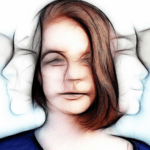
Personality Disorders
August 17, 2024
Suicidality
August 17, 2024Schizophrenia is a complex mental illness that affects how a person thinks, feels, and behaves. It can cause individuals to experience hallucinations, delusions, and difficulty in distinguishing between what is real and what is not. The symptoms of schizophrenia can vary from person to person and may come and go over time.
People with schizophrenia may also have trouble with cognitive abilities such as memory, attention, and decision-making. This condition typically emerges in early adulthood but can develop at any age. It’s important to note that schizophrenia is not the same as having multiple personalities or split personality disorder.
While the exact cause of schizophrenia is still unknown, research suggests that a combination of genetic, environmental, and neurological factors play a role in its development. Treatment for schizophrenia often involves a combination of medication, therapy, and support services tailored to each individual’s needs.
Symptoms and Types of Schizophrenia
Schizophrenia is a complex mental health condition classified under psychotic disorders, manifesting in various symptoms and types. Symptoms can range from hallucinations, delusions, and disorganized thinking to social withdrawal and emotional flatness. These symptoms can significantly impact an individual’s daily life and relationships.
There are different types of schizophrenia, including paranoid schizophrenia, where individuals may experience extreme paranoia or false beliefs about being persecuted. Disorganized schizophrenia involves thought disorder and difficulty organizing thoughts logically. Catatonic schizophrenia can cause unusual motor behaviors or speech difficulties.
Other types include residual schizophrenia, where symptoms have decreased in intensity but still persist, as well as undifferentiated schizophrenia, which does not fit into any specific subtype category precisely. Understanding the diverse range of symptoms and types is crucial for early detection and appropriate treatment interventions tailored to each individual’s needs.
Symptoms of schizophrenia can be divided into three categories: positive, negative, and cognitive symptoms.
Positive symptoms include behaviors or experiences that are not present in healthy individuals. These may include hallucinations (seeing or hearing things that are not real), delusions (false beliefs not based on reality), and disorganized thinking and speech.
Negative symptoms refer to a decrease in normal functioning, such as reduced emotional expression, social withdrawal, lack of motivation, and difficulty experiencing pleasure.
Cognitive symptoms involve problems with thinking processes, including difficulty with memory, attention, and decision-making. These symptoms can make it challenging to perform daily tasks and maintain relationships.
Some common signs of schizophrenia may include:
- Delusions or false beliefs
- Hallucinations (seeing or hearing things that are not real)
- Disorganized thinking or speech
- Emotional flatness or lack of emotions
- Social withdrawal
- Difficulty expressing emotions or connecting with others
- Lack of motivation
- Cognitive impairments such as problems with memory and decision-making
- Unusual motor behaviors
- Difficulty understanding reality
It is essential to note that not everyone will experience all these symptoms at once, and their severity can vary greatly between individuals. Identifying early warning signs is crucial for managing schizophrenia effectively and preventing relapse.
Types of Schizophrenia: Paranoid Schizophrenia
1. Paranoid schizophrenia: This is the most common type of schizophrenia, characterized by extreme paranoia and delusions of persecution. Individuals with this subtype may believe that others are trying to harm or control them.
2. Disorganized schizophrenia: This type involves disorganized thinking and speech, as well as difficulty organizing one’s thoughts logically. Individuals with this subtype may have trouble communicating and functioning in daily life.
3. Catatonic schizophrenia: This subtype is marked by unusual motor behaviors, such as remaining immobile for extended periods or repeating other people’s words or actions (echolalia or echopraxia).
4. Residual schizophrenia: People with residual schizophrenia have a history of experiencing positive symptoms but currently have diminished symptoms. They may still experience negative symptoms such as social withdrawal and lack of motivation.
5. Undifferentiated schizophrenia: This category includes individuals who do not fit into any specific subtype precisely. They may exhibit a combination of various symptoms from different subtypes.
6. Schizoaffective disorder: This condition combines symptoms of both schizophrenia and mood disorders, such as depression or bipolar disorder.
7. Brief psychotic disorder: This type involves a sudden onset of psychotic symptoms that last less than one month. It can be triggered by a stressful event, substance use, or medication.
8. Delusional disorder: This disorder is characterized by persistent delusions without other typical schizophrenia symptoms, such as hallucinations or disorganized thinking.
It’s essential to note that the classification of schizophrenia subtypes may vary depending on the diagnostic criteria and can change over time as symptoms evolve. It is crucial to seek professional help for proper diagnosis and treatment, as early intervention can improve outcomes and quality of life for individuals living with schizophrenia.
Causes of Schizophrenia
When it comes to the causes of schizophrenia, there isn’t a single factor that can be pinpointed as the sole reason behind this complex mental health condition. Instead, it is believed to be a result of a combination of genetic, biological, environmental, and psychological risk factors.
Genetics plays a significant role in predisposing individuals to schizophrenia. Research suggests that having a family history of the disorder increases one’s risk of developing schizophrenia. Additionally, certain gene variations have been linked to an increased susceptibility to this condition.
Brain chemistry and structure also play a crucial role in the development of schizophrenia. Imbalances in neurotransmitters such as dopamine and glutamate have been associated with symptoms of the disorder. Furthermore, structural abnormalities in the brain may impact how it functions and processes information.
Environmental factors like prenatal exposure to viruses or malnutrition, as well as stressful life events during childhood or early adulthood, can also contribute to triggering schizophrenia in vulnerable individuals. It’s important to consider these various factors when trying to understand what causes schizophrenia.
Diagnosis and Treatment Options: Medications for Schizophrenia
Being diagnosed with mental health conditions such as schizophrenia can be a daunting experience for many individuals. The process of diagnosing this complex mental health condition involves a thorough evaluation by mental healthcare professionals, including psychiatrists and psychologists. They may use various assessments and screenings to determine the presence of symptoms associated with schizophrenia.
Treatment options for schizophrenia typically involve a combination of medication, therapy, and support services. Antipsychotic medications are commonly prescribed to help manage symptoms such as hallucinations, delusions, and disorganized thinking. Therapy sessions, such as cognitive-behavioral therapy (CBT) or family therapy, can also be beneficial in helping individuals cope with their condition.
In addition to medical interventions, lifestyle modifications like maintaining a healthy diet, regular exercise routine, and adequate sleep can also play a crucial role in managing schizophrenia symptoms. Seeking support from loved ones and joining support groups can provide valuable emotional assistance on the journey toward recovery.
It’s important for individuals living with schizophrenia to work closely with their healthcare providers to find an individualized treatment plan that works best for them. With proper diagnosis and comprehensive treatment approaches tailored to their needs, individuals with schizophrenia can lead fulfilling lives despite the challenges they may face.
Living with Schizophrenia: Tips and Coping Mechanisms
Living with schizophrenia, a serious mental illness, can present unique challenges, but there are ways to cope and manage symptoms effectively. Establishing a routine can provide a sense of structure and stability in daily life. Engaging in activities that promote relaxation, such as meditation or yoga, can help reduce stress and anxiety levels.
Building a strong support network is essential. Surround yourself with understanding friends and family members who can offer encouragement and assistance when needed. It’s also crucial to follow the treatment plan prescribed by healthcare professionals consistently.
Practicing self-care is important for overall well-being. Make sure to prioritize healthy habits like getting enough sleep, eating nutritious foods, and staying physically active. Remember that seeking help is not a sign of weakness; reaching out for professional support can make a significant difference in managing symptoms effectively.
Breaking the Stigma and Supporting Those with Schizophrenia
Breaking the stigma surrounding schizophrenia and other mental disorders is crucial for creating a more inclusive and understanding society. It’s essential to educate ourselves on what schizophrenia truly is, debunking myths and misconceptions that often lead to discrimination. By fostering empathy and compassion, we can create a supportive environment for individuals living with schizophrenia.
Supporting those with schizophrenia involves offering non-judgmental listening ears, patience, and encouragement. Acknowledging their struggles while emphasizing their strengths can go a long way in boosting their self-esteem and confidence. Providing practical support, such as helping them access mental health treatment or therapy, can make a significant difference in their journey toward recovery.
It’s important to promote open conversations about mental health to normalize discussions around conditions like schizophrenia. Encouraging acceptance and understanding within communities can help individuals feel less isolated and more supported in managing their condition effectively. Together, we can break down barriers and create a more compassionate world for everyone affected by schizophrenia.






